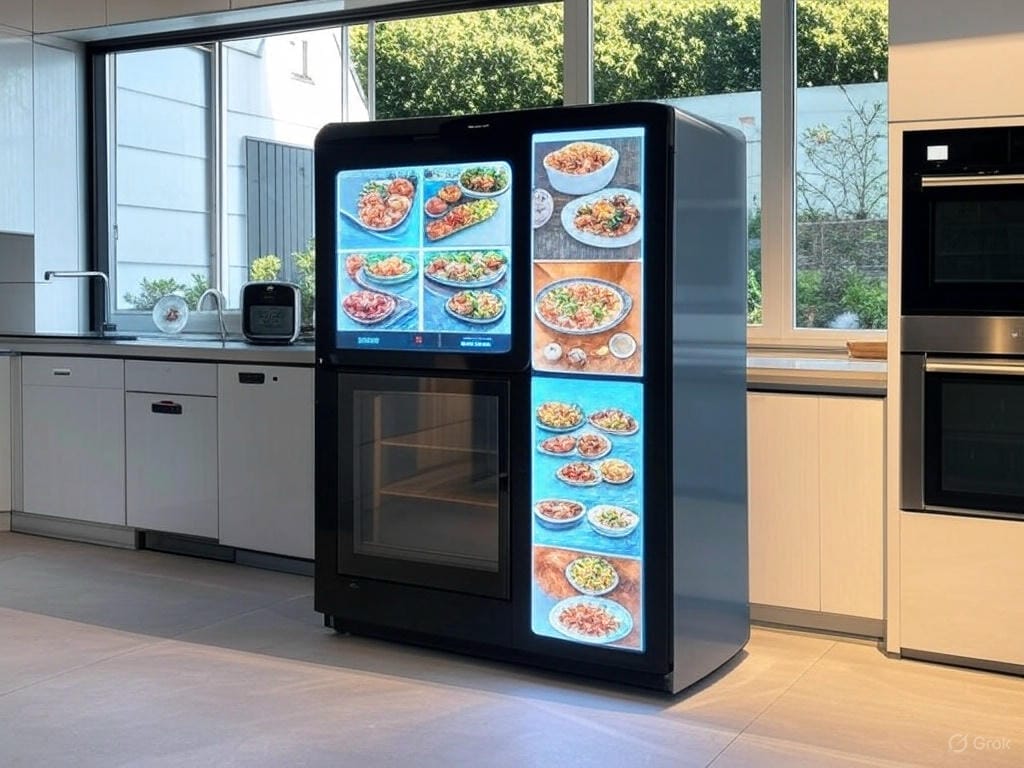Smart Kitchens in the UK by 2050. Kitchens have always been the heart of the home, but by 2050, they could become the brain too.
In the UK, where culinary traditions meet a growing appetite for innovation, smart kitchens are set to revolutionise how we cook, eat, and manage food.
From AI-driven appliances to health-focused features and sustainable designs, let’s explore what the future of smart kitchens might hold for Brits over the next 25 years, building on trends already emerging in 2025.
AI-Driven Appliances: Cooking Made Effortless
By 2050, AI will likely transform UK kitchens into hubs of efficiency.
Today, smart appliances like a Smart Oven can suggest recipes based on ingredients you have.
In 2050, your fridge might scan its contents, suggest a low-calorie shepherd’s pie for dinner, and sync with an oven to preheat—all for around £800 for a mid-range model.
Picture a family in Leeds: their AI kitchen assistant, integrated into a countertop hub costing £300, could analyse dietary needs—factoring in a child’s nut allergy—and order missing ingredients via drone delivery within an hour.
The UK’s 92% household internet access in 2023 sets the stage for such connectivity, but privacy will be a concern.
With data breaches affecting 7% of UK schools in 2023, future kitchens will need strong cybersecurity to protect family data.
Health-Focused Features: Eating Smarter
Smart kitchens in 2050 could prioritise health, addressing the UK’s growing focus on wellness.
In 2023, 4.9 million Brits had diabetes, a number likely to rise.
Future kitchens might help manage this through tech.
A smart countertop scanner, priced at £150, could analyse food for nutritional content, alerting a user in Cardiff to high sugar levels in a snack, while suggesting a healthier alternative.
Appliances might also integrate with wearables to personalise meals.
A cooker could adjust recipes based on your fitness tracker’s data, ensuring a post-workout meal in Glasgow has the right protein balance.
However, over-reliance on tech could be a pitfall—5% of users report feeling overwhelmed by smart home devices today, so intuitive designs will be key to ensuring accessibility for all, including the elderly.
Sustainability: Zero-Waste Kitchens
Sustainability will be at the core of smart kitchens by 2050, aligning with the UK’s net zero goals.
Today, brands like IKEA offer sustainable kitchen products, such as compost bins and energy-efficient appliances.
By 2050, kitchens could feature built-in composting units that turn food waste into fertiliser for a home herb garden, reducing the 27 million tonnes of household waste produced in 2023 by a significant margin.
In a Bristol flat, a family might use a £500 smart fridge with AI to track food expiry, minimising waste by suggesting meals like a veggie stir-fry from near-expiry produce.
Water recycling systems, filtering and reusing greywater for dishwashing, could save 30% of household water use—vital as the UK faces increasing water stress, with parts of England at risk by 2040.
Cost barriers, however, might limit adoption; ensuring affordability will be crucial to avoid excluding lower-income households.
Social and Lifestyle Impacts
Smart kitchens in 2050 could reshape daily life in the UK.
Time saved on cooking—potentially 10 hours a week per household—might strengthen family bonds, with parents in Manchester spending more time with kids instead of prepping meals.
Community sharing could also rise: a smart kitchen app might connect neighbours in a Birmingham estate, letting them swap surplus ingredients, reducing waste and fostering connection.
Yet, there are risks.
The digital divide—15% of UK adults lacked digital skills in 2023—could exclude some from these benefits.
Mental health, already a concern with 9 million Brits experiencing loneliness in 2023, might improve with stronger community ties, but over-dependence on tech could make kitchens feel impersonal, losing the warmth of traditional cooking.
What Shapes the Future?
The evolution of smart kitchens in the UK by 2050 will depend on several factors:
- Technology: Advances in AI and IoT (Internet of Things) will drive appliance connectivity.
- Policy: Government incentives for sustainable tech will boost adoption.
- Health Trends: Rising chronic conditions will push demand for health-focused features.
- Society: Cultural openness to tech in kitchens will determine its integration.
A Smarter Way to Cook Awaits
By 2050, smart kitchens in the UK could blend cutting-edge tech, health awareness, and sustainability, making cooking easier, healthier, and greener.
From AI-driven meal prep in Edinburgh to zero-waste systems in Southampton, the future looks promising—but only if accessibility and human connection remain priorities.
The UK’s knack for embracing innovation, from electric cars to smart meters, suggests we’ll adapt to this kitchen revolution.
Will your kitchen be your personal chef or a community hub?
What’s Your Vision? Imagine your smart kitchen in 2050: Are you cooking with an AI assistant, or sharing ingredients with neighbours?
Share your thoughts in the comments.
Let’s envision the future of food together!
Hope you’ve found our article, Smart Kitchens in the UK by 2050 useful.
Thank you for taking the time to read my post. If you’d like to add a comment or thought on this post, please use the comments section below. I can also be contacted via the online contact form. Keep up to date with the latest news on social media.

